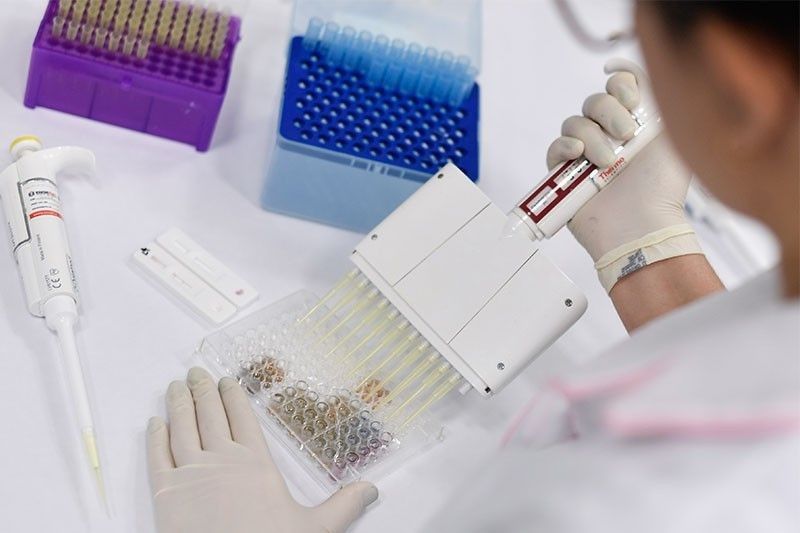China to donate 500,000 vaccine doses to Philippines
By Janvic Mateo | January 17, 2021
MANILA, Philippines — The Chinese government has committed to donate 500,000 doses of vaccines for COVID-19, the Department of Foreign Affairs (DFA) announced yesterday.
Chinese State Councilor and Foreign Minister Wang Yi informed Foreign Affairs Secretary Teodoro Locsin Jr. of the Chinese government’s intention during their bilateral talks in Taguig yesterday, the DFA said in a statement.
No additional details were provided, such as the brand of the vaccine to be donated.
The Philippine government had earlier announced that it secured 25 million doses of Sinovac from China to be delivered in batches starting next month.
Sinovac and the other Chinese vaccine, Sinopharm, have yet to secure emergency use authority in the country.
According to DFA, China’s intention to donate the 500,000 doses of vaccines is in keeping with the commitment made by Chinese President Xi Jinping to President Duterte.
The DFA said the two ministers continued discussions on cooperation to address the pandemic in terms of containment, vaccines and economic revitalization.
Wang and Locsin also committed to step-up collaboration on infrastructure projects under the Build, Build, Build program.
They also “confirmed that differences on contentious maritime issues do not represent the entirety of the Philippines-China bilateral relationship.”
“Both sides renewed their commitment to mutual respect, managing issues peacefully and in accordance with international law, and exploring areas for possible cooperation,” the DFA said.
Strong Philippines, China ties
Meanwhile, the strong relationship between the Philippines and China has withstood the test of the coronavirus pandemic, Wang said.
“I think it’s fair to say that the China-Philippines relations have withstood the test of the pandemic and learning this process, our friendship has been further deepened,” he said in Mandarin.
“As you said, COVID response and economic recovery will be the top two priorities for both of our countries. So we would like to suggest that our two countries work together – focusing on COVID response and mutually beneficial cooperation and a sustained and new momentum to our relationship,” he told Locsin.
The visiting foreign minister also pointed out the need to “shelve differences and build common ground” and work closely together to achieve more fruitful outcomes for the two countries’ comprehensive strategic and cooperative relationship.
In his statement, Locsin noted how the close cooperation between the Philippines and China in addressing the impact of the pandemic has strengthened the overall ties between the two countries.
He underscored China’s significance to the Philippines, describing its ties with Beijing as “among our most important bilateral relationships.”
“We are elated that despite the challenges of the pandemic, our high-level engagements have stayed on track,” said Locsin. “Our close cooperation to beat COVID-19 has only further enhanced our overall ties and deepened our friendship.”
Despite the scale of the impact of the pandemic worldwide, the foreign affairs chief noted how the two countries’ robust and responsive comprehensive strategic cooperation has bore fruit.
“Under the guiding hand of our two presidents – whose personal friendship reflects our close national bonds – our engagements in all levels have resumed and our collaboration on priority economic and infrastructure projects is ongoing,” he added.
Locsin noted China’s position as the Philippines’ top trading partner in the past four years, as well as a leading source for investments, official development assistance and tourism.
“Mutual support and growing trust characterize our ties more than ever. For the Philippines has risen in China’s defense and brought along the rest of the region in that action,” he added.
On regional stability and security, Locsin said, “It behooves us to show our ability to rise to the challenge of managing differences peacefully and in accordance with law, while making headway towards trust-building and practical concrete mutually beneficial cooperation.”
Wang arrived Friday for his third official visit to the Philippines, which the DFA said was a reciprocation of Locsin’s visit to China last October.
“Together with their virtual meeting in July last year, the State Councilor’s visit attests to the sustained high-level engagement of the two countries. It also symbolizes the determination and steady progress of both sides toward gradually re-opening their societies and economies,” the DFA added.
Locsin and Wang had a closed-door meeting yesterday “to consider ways to accelerate mutually beneficial cooperation, particularly in the priority areas of trade and investments, infrastructure development and addressing the pandemic.”
Wang also joined the signing ceremony of the Philippines-China agreement on economic and technical cooperation, as well as the ceremonial launch of the RMB (renminbi) clearing facility of the Bank of China.
According to the DFA, the agreement involves a grant of 500 million Chinese yuan (around P3.72 billion) for livelihood, infrastructure facilities, feasibility studies for major projects and other projects to be mutually agreed upon by the two governments.
“This is the seventh such grant provision to the Philippines by China since 2016. This brings the cumulative grant resources received from the Chinese government to a total of 3.25 billion Chinese yuan, or approximately P24.16 billion,” the DFA said.
Also yesterday, the Chinese embassy said the two countries signed a commercial contract for the Subic-Clark railway project.
It said China financed the railway project worth approximately $940 million, so far the highest funded government-to-government cooperation project between China and the Philippines.
The project will connect Subic Bay Freeport Zone and Clark International Airport and link it to the North Railway Project of the Department of Transportation, said the embassy.
https://www.philstar.com/headlines/2021/01/17/2071001/china-donate-500000-vaccine-doses-philippines


